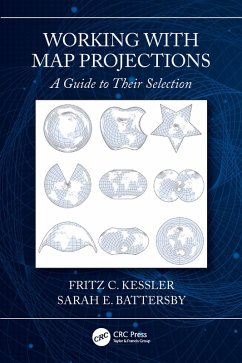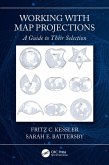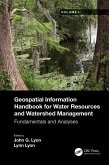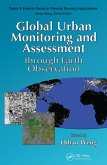81,95 €
81,95 €
inkl. MwSt.
Sofort per Download lieferbar

41 °P sammeln
81,95 €
Als Download kaufen

81,95 €
inkl. MwSt.
Sofort per Download lieferbar

41 °P sammeln
Jetzt verschenken
Alle Infos zum eBook verschenken
81,95 €
inkl. MwSt.
Sofort per Download lieferbar
Alle Infos zum eBook verschenken

41 °P sammeln
- Format: ePub
- Merkliste
- Auf die Merkliste
- Bewerten Bewerten
- Teilen
- Produkt teilen
- Produkterinnerung
- Produkterinnerung

Bitte loggen Sie sich zunächst in Ihr Kundenkonto ein oder registrieren Sie sich bei
bücher.de, um das eBook-Abo tolino select nutzen zu können.
Hier können Sie sich einloggen
Hier können Sie sich einloggen
Sie sind bereits eingeloggt. Klicken Sie auf 2. tolino select Abo, um fortzufahren.

Bitte loggen Sie sich zunächst in Ihr Kundenkonto ein oder registrieren Sie sich bei bücher.de, um das eBook-Abo tolino select nutzen zu können.
This book explains why for any given map there isn't a "best" map projection. It presents an understanding of the processes necessary to make sound decisions on selecting an appropriate map projection for a given data set. It helps readers weigh the pros and cons of choosing one projection over another to suit the map's intended purpose.
- Geräte: eReader
- mit Kopierschutz
- eBook Hilfe
- Größe: 39.61MB
Andere Kunden interessierten sich auch für
![Working with Map Projections (eBook, PDF) Working with Map Projections (eBook, PDF)]() Fritz KesslerWorking with Map Projections (eBook, PDF)81,95 €
Fritz KesslerWorking with Map Projections (eBook, PDF)81,95 €![Applications of Small Unmanned Aircraft Systems (eBook, ePUB) Applications of Small Unmanned Aircraft Systems (eBook, ePUB)]() Applications of Small Unmanned Aircraft Systems (eBook, ePUB)46,95 €
Applications of Small Unmanned Aircraft Systems (eBook, ePUB)46,95 €![Remote Sensing Applications for the Urban Environment (eBook, ePUB) Remote Sensing Applications for the Urban Environment (eBook, ePUB)]() George Z. XianRemote Sensing Applications for the Urban Environment (eBook, ePUB)54,95 €
George Z. XianRemote Sensing Applications for the Urban Environment (eBook, ePUB)54,95 €![Geospatial Information Handbook for Water Resources and Watershed Management, Volume I (eBook, ePUB) Geospatial Information Handbook for Water Resources and Watershed Management, Volume I (eBook, ePUB)]() Geospatial Information Handbook for Water Resources and Watershed Management, Volume I (eBook, ePUB)121,95 €
Geospatial Information Handbook for Water Resources and Watershed Management, Volume I (eBook, ePUB)121,95 €![Global Urban Monitoring and Assessment through Earth Observation (eBook, ePUB) Global Urban Monitoring and Assessment through Earth Observation (eBook, ePUB)]() Global Urban Monitoring and Assessment through Earth Observation (eBook, ePUB)68,95 €
Global Urban Monitoring and Assessment through Earth Observation (eBook, ePUB)68,95 €![Food Security, Food Prices and Climate Variability (eBook, ePUB) Food Security, Food Prices and Climate Variability (eBook, ePUB)]() Molly BrownFood Security, Food Prices and Climate Variability (eBook, ePUB)52,95 €
Molly BrownFood Security, Food Prices and Climate Variability (eBook, ePUB)52,95 €![Deep Learning for Remote Sensing Images with Open Source Software (eBook, ePUB) Deep Learning for Remote Sensing Images with Open Source Software (eBook, ePUB)]() Rémi CressonDeep Learning for Remote Sensing Images with Open Source Software (eBook, ePUB)34,95 €
Rémi CressonDeep Learning for Remote Sensing Images with Open Source Software (eBook, ePUB)34,95 €-
-
-
This book explains why for any given map there isn't a "best" map projection. It presents an understanding of the processes necessary to make sound decisions on selecting an appropriate map projection for a given data set. It helps readers weigh the pros and cons of choosing one projection over another to suit the map's intended purpose.
Dieser Download kann aus rechtlichen Gründen nur mit Rechnungsadresse in A, B, BG, CY, CZ, D, DK, EW, E, FIN, F, GR, HR, H, IRL, I, LT, L, LR, M, NL, PL, P, R, S, SLO, SK ausgeliefert werden.
Produktdetails
- Produktdetails
- Verlag: Taylor & Francis eBooks
- Seitenzahl: 317
- Erscheinungstermin: 3. Mai 2019
- Englisch
- ISBN-13: 9781351396059
- Artikelnr.: 56840652
- Verlag: Taylor & Francis eBooks
- Seitenzahl: 317
- Erscheinungstermin: 3. Mai 2019
- Englisch
- ISBN-13: 9781351396059
- Artikelnr.: 56840652
- Herstellerkennzeichnung Die Herstellerinformationen sind derzeit nicht verfügbar.
Fritz Kessler, PhD, is a senior research associate and an associate professor at Penn State University. His primary responsibilities are teaching in the resident and online world campus environments. Some of the courses he has taught include map projections, datums, and coordinate systems, cartography, surveying, GIS, spatial statistics, and research methods. Dr. Kessler's research interests include map projections, geographic visualization, and cognitive cartography. His recent publications include a co-authored book, Thematic Cartography and GeoVisualization; an article, "Volunteered Geographic Information: A Bicycling Enthusiast Perspective" in Cartography and Geographic Information Science; two co-authored papers, "Analysis of Thematic Maps Published in Two Geographical Journals in the Twentieth Century" in Annals of the Association of American Geographers and "Cues for Interpreting Distortion in Map Projections" in Journal of Geography; a co-authored book chapter "Thematic Mapping" in The History of Cartography Project, Volume 6: Cartography in the Twentieth Century; a chapter contribution "Symbolizing America" to Mapping American: Exploring the Continent; and an authored entry "Projections" in the International Encyclopedia of Human Geography. Dr. Kessler earned a PhD in geography in 1999 at the University of Kansas, an MS at Penn State, and a BS at Ohio University. He is a member of the International Cartographic Association Commission on Map Projections, vice president of the North American Cartographic and Information Society, and a board member of the Cartography and Geographic Information Society. He was a former editor in chief of Cartographic Perspectives.
Sarah E. Battersby, PhD, is a senior research scientist at Tableau Software. Her primary area of focus is cartography with an emphasis on cognition. Her work emphasizes how we can help people visualize and use spatial information more effectively. Her research has covered a variety of areas, including perception in dynamic map displays, geospatial technologies and spatial thinking abilities, and the impact of the map projection on spatial cognition. Sarah earned a PhD in geography in 2006 at the University of California at Santa Barbara. She is a member of the International Cartographic Association Commission on Map Projections and a past president (2015-2016) of the Cartography and Geographic Information Society, a society composed of educators, researchers, and practitioners involved in the design, creation, use, and dissemination of geographic information. Dr. Battersby is also a member of the National Geospatial Advisory Committee, a Federal Advisory Committee sponsored by the Department of the Interior under the Federal Advisory Committee Act.
Sarah E. Battersby, PhD, is a senior research scientist at Tableau Software. Her primary area of focus is cartography with an emphasis on cognition. Her work emphasizes how we can help people visualize and use spatial information more effectively. Her research has covered a variety of areas, including perception in dynamic map displays, geospatial technologies and spatial thinking abilities, and the impact of the map projection on spatial cognition. Sarah earned a PhD in geography in 2006 at the University of California at Santa Barbara. She is a member of the International Cartographic Association Commission on Map Projections and a past president (2015-2016) of the Cartography and Geographic Information Society, a society composed of educators, researchers, and practitioners involved in the design, creation, use, and dissemination of geographic information. Dr. Battersby is also a member of the National Geospatial Advisory Committee, a Federal Advisory Committee sponsored by the Department of the Interior under the Federal Advisory Committee Act.
Part I: Projection Basics, Cartographic Symbolization, Projection
Influences on People's Mental Maps, and Selecting Projections 1.
Introduction 2. A Gentle Introduction to Map Projections 3. Representing
Spatial Data through Cartographic Symbolization 4. Map Projections'
Influence on Data Representation 5. Assistance Using Projection Selection
Guidance Tools Part II: Projection Selection by Map Type 6. Continuously
Occurring and Abruptly Changing 7. Continuously Occurring and Smoothly
Changing 8. Discretely Occurring and Smoothly Changing 9. Discretely
Occurring and Abruptly Changing 10. Special Maps 11. Web-Based Map
Projection Resources
Influences on People's Mental Maps, and Selecting Projections 1.
Introduction 2. A Gentle Introduction to Map Projections 3. Representing
Spatial Data through Cartographic Symbolization 4. Map Projections'
Influence on Data Representation 5. Assistance Using Projection Selection
Guidance Tools Part II: Projection Selection by Map Type 6. Continuously
Occurring and Abruptly Changing 7. Continuously Occurring and Smoothly
Changing 8. Discretely Occurring and Smoothly Changing 9. Discretely
Occurring and Abruptly Changing 10. Special Maps 11. Web-Based Map
Projection Resources
Part I: Projection Basics, Cartographic Symbolization, Projection
Influences on People's Mental Maps, and Selecting Projections 1.
Introduction 2. A Gentle Introduction to Map Projections 3. Representing
Spatial Data through Cartographic Symbolization 4. Map Projections'
Influence on Data Representation 5. Assistance Using Projection Selection
Guidance Tools Part II: Projection Selection by Map Type 6. Continuously
Occurring and Abruptly Changing 7. Continuously Occurring and Smoothly
Changing 8. Discretely Occurring and Smoothly Changing 9. Discretely
Occurring and Abruptly Changing 10. Special Maps 11. Web-Based Map
Projection Resources
Influences on People's Mental Maps, and Selecting Projections 1.
Introduction 2. A Gentle Introduction to Map Projections 3. Representing
Spatial Data through Cartographic Symbolization 4. Map Projections'
Influence on Data Representation 5. Assistance Using Projection Selection
Guidance Tools Part II: Projection Selection by Map Type 6. Continuously
Occurring and Abruptly Changing 7. Continuously Occurring and Smoothly
Changing 8. Discretely Occurring and Smoothly Changing 9. Discretely
Occurring and Abruptly Changing 10. Special Maps 11. Web-Based Map
Projection Resources







